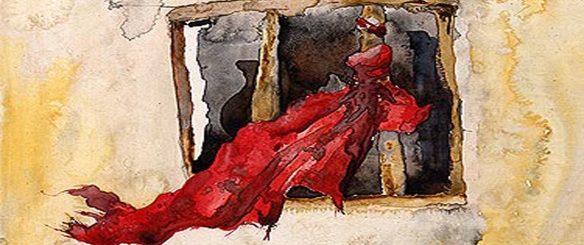
A Heart That Responds to God’s Call.
Rahab gazed out her window across the valley. On the far side of the spring-flooding river thousands of people were camped. These, Rahab knew, were the people of the God whom she herself believed was “the LORD…God in heaven above and on the earth below.” She new she was alone among her people in her belief; their god was their stomach, their pleasures, and their power of trade. But Rahab had suffered under her peoples’ abuses. There was no reason for her to love their god.
Glancing back out her window Rahab felt the shaking of earth and heard the rumble of boulders tumbling upstream the river Jordan. Then, like a swarm of ants she saw the multitude of Israelites crossing the riverbed, moving westward across the valley. She checked the scarlet cord hanging out her window for the hundredth time. It was still there.
Rahab had staked her life and the lives of everyone she loved on hearing the still small voice in her heart that assured her that Yahweh—the LORD—was the One and Only God, the one worthy of worship the one to whom her allegiance was due. Having harboured the two Israelite spies days earlier, Rahab had made her loyalties known and was willing to face the consequences, come what may. The author of Hebrews 11 records these first steps of Rahab’s faith—of her bold scarlet cord flying like a flag in the face of her old way of life—for our benefit.
“By faith,” we read, “the prostitute Rahab, because she welcomed the spies, was not killed with those who were disobedient.” There are some loaded words and ideas in that verse, and it’s worth sorting through them, but primarily we need to hear God’s message. In this one short verse God teaches us three things about Himself: Who He calls; What His call creates; and How His call changes lives.
WHO GOD CALLS: God calls prostitutes. He calls the weak, the poor, the failures, the lonely, the abused and the misunderstood. He calls you and me, because no matter how we present on the outside, we’re all prostitutes of a sort. We’ve found ourselves—by force or by choice—wasting the great gift of our lives. We have believed one lie or another that we are victims, trapped in our life situation, or that we are gods with the right to create whatever self-interested life situation we want to pursue. But we’ve found ourselves wounded because of those lies. God’s call is for the Rahabs of this world, for you and me. God’s call sees us as the holy creatures He designed us to be, rescues us from the bondage we’re in, and invites us to join His people on a journey to become holy and wholly His.
WHAT GOD’S CALL CREATES: God’s call creates faith. His voice, His Word, speaks uniquely, kindling within receptive hearts something unknown to the hard and skeptical hearts of this world. Rahab herself recognized the role of the heart to lead people to a place where they either seek out God for help, or fully and finally reject Him.
“We have heard,” explained Rahab to the spies, “how the LORD dried up the water of the Red Sea for you when you came out of Egypt…(and) when we heard of it, our hearts melted and everyone’s courage failed because of you, for the LORD your God is God in heaven above and on the earth below” (Joshua 2:10,11).
Hearts melted. The courage of everyone in Jericho failed—everyone but Rahab. For some reason Rahab, melted heart and all, reached out to ally herself with God. In that moment, Rahab’s faith was born. Rahab’s belief was a simple heart act of obedience to God’s call.
HOW GOD’S CALL CHANGES LIVES: Rahab’s simple trust that God is LORD of all not only produced obedience in her heart. The obedience moved outward to her choices. She chose to protect the spies from Jericho’s evil king and ruthless soldiers. She chose to hide the men on her rooftop, lower them down by a rope through the window, and direct them to the nearby hills for a safe escape. These choices were the acts of a very different Rahab than the Rahab she had been before hearing God’s call. Later, when the spies returned to rescue her from the tumultuous town, Rahab’s life was changed even more dramatically. She gave up her business of prostitution, entered Hebrew society first as an alien and then married to a Jewish man, bearing him a son who would become part of the lineage of Jesus.
God calls. We can be sure of that. But until you and I admit that He calls us, that He creates faith in us, and that He changes our lives, we will miss out. We will miss out on knowing the God who made us, the God who loves us, and the God who wants to give us a new life. It starts with our hearts—hearts ready to respond to God’s call. It’s time to hang our scarlet cords, to plant our flag. That’s responding to God’s call.









